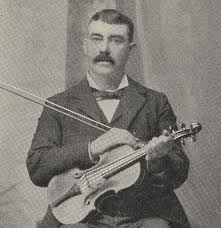Annotation:Queen of the Fair: Difference between revisions
m Text replacement - "garamond, serif" to "sans-serif" |
No edit summary |
||
| Line 1: | Line 1: | ||
---------- | |||
---- | {{TuneAnnotation | ||
|f_tune_annotation_title= https://tunearch.org/wiki/Annotation:Queen_of_the_Fair > | |||
'''QUEEN OF THE FAIR''' ("Bainriogan an Aonaig", "Banríon an Aonaigh"). Irish, Double Jig. D Major. Standard tuning (fiddle). AABBCC'. Composition of the tune is credited (in O'Neill's '''Irish Folk Music''', pp. 395-396) to virtuoso Chicago fiddler [[Biography:John McFadden]] (c. 1847-c. 1913, born Carrowmore, Co. Mayo), a contemporary of Captain Francis O'Neill, and was first published in O’Neill’s '''Dance Music of Ireland''' (1907). The melody achieved some currency in Ireland in the latter half of the century after the 1931 recording by the old Ballinakill Céilí Band circulated. | |f_annotation='''QUEEN OF THE FAIR''' ("Bainriogan an Aonaig", "Banríon an Aonaigh"). Irish, Double Jig. D Major. Standard tuning (fiddle). AABBCC'. Composition of the tune is credited (in O'Neill's '''Irish Folk Music''', pp. 395-396) to virtuoso Chicago fiddler [[Biography:John McFadden]] (c. 1847-c. 1913, born Carrowmore, Co. Mayo), a contemporary of Captain Francis O'Neill, and was first published in O’Neill’s '''Dance Music of Ireland''' (1907). The melody achieved some currency in Ireland in the latter half of the century after the 1931 recording by the old Ballinakill Céilí Band circulated. | ||
[[File:mcfadden.jpg| | [[File:mcfadden.jpg|230px|thumb|left|John McFadden]] | ||
|f_source_for_notated_version=the playing partners of Chicago police Sergeant James Early and John McFadden, a piper and fiddler from adjoining counties in the province of Connaght [O’Neill]; Tommy Peoples and Paul Brady (Ireland) [Brody]; Brendan Mulvihill (Baltimore, Md.) [Mulvihill]; set dance music recorded live at Na Píobairí Uilleann, in the 1980’s [Taylor]. | |||
|f_printed_sources= Brody ('''Fiddler’s Fakebook'''), 1983; p. 223. Mulvihill ('''1st Collection'''), 1986; No. 62, p. 78. O'Neill ('''Dance Music of Ireland: 1001 Gems'''), 1907; No. 300, p. 69. Taylor ('''At the Crossroads Dance'''), 1992; No. 48, p. 36. Taylor ('''Music for the Sets: Yellow Book'''), 1995; p. 17. | |||
|f_recorded_sources=Shanachie 29003, Tommy Peoples and Paul Brady "The High Part of the Road." Green Linnet 1012, Martin Mulvihill "Traditional Irish Fiddling From County Limerick." Shaskeen - "My Love is in America." | |||
|f_see_also_listing=Alan Ng's Irishtune.info [http://www.irishtune.info/tune/1623/]<br> | |||
Jane Keefer's Folk Music Index: An Index to Recorded Sources [http://www.ibiblio.org/keefer/q01.htm#Queofthf]<br> | |||
Hear the Ballinakill Céilí Band's recording at the Comhaltas Archive [http://comhaltasarchive.ie/search?tab=tracks&q=queen+of+the+fair#/tracks/15737] [http://comhaltasarchive.ie/search?tab=tracks&q=queen+of+the+fair#/tracks/13983]<br> | |||
Hear accordion player Paddy Gavin's recording at the Comhaltas Archive [http://comhaltasarchive.ie/search?tab=tracks&q=queen+of+the+fair#/tracks/6127]<br> | |||
Hear County Kerry fiddler Denis Murphy's 1950 recording at the Internet Archive [http://ia700304.us.archive.org/4/items/DenisMurphyQueenoftheFairMunsterJig/Denis_MurphyQueen_of_the_Fair_Munster_Jig.mp3]<br> | |||
}} | |||
------------- | |||
<br> | <br> | ||
<br> | <br> | ||
</font></p> | </font></p> | ||
<p><font face="sans-serif" size="4"> | <p><font face="sans-serif" size="4"> | ||
''Source for notated version'': | ''Source for notated version'': | ||
<br> | <br> | ||
<br> | <br> | ||
</font></p> | </font></p> | ||
<p><font face="sans-serif" size="4"> | <p><font face="sans-serif" size="4"> | ||
''Printed sources'': | ''Printed sources'': | ||
<br> | <br> | ||
<br> | <br> | ||
</font></p> | </font></p> | ||
<p><font face="sans-serif" size="4"> | <p><font face="sans-serif" size="4"> | ||
''Recorded sources'': <font color=teal> | ''Recorded sources'': <font color=teal></font> | ||
<br> | <br> | ||
<br> | <br> | ||
| Line 24: | Line 35: | ||
<p><font face="sans-serif" size="4"> | <p><font face="sans-serif" size="4"> | ||
See also listing at:<br> | See also listing at:<br> | ||
</font></p> | </font></p> | ||
<br> | <br> | ||
Revision as of 01:59, 23 October 2021
X:1 T:Queen of the Fair M:6/8 L:1/8 R:Jig S:O’Neill – Dance Music of Ireland: 1001 Gems (1907), No. 330 Z:AK/Fiddler’s Companion K:D A/G/ | FEF DA,A, | DFA dAF | GdG FGA | BGE EFG | FEF DA,A, | DF(3A/B/c/ dAF | GdG EFG | FDD D2 :| |: (3b/a/g/ | fdf ece | dAG FED|DF(3A/B/c/ dAF | GBG EFG | fda ece | dAG FED | DFd EFG | FDD D2 :| |: A | (3d/d/d/dd fdd | add fdd | B/c/d/e/f g2e | fda ecA | |1 Add fdd | add efg | EFG dAG | FDD D2 :| |2 a/g/fa geg | Fda ecA | EFG dAG | FDD D2 ||
QUEEN OF THE FAIR ("Bainriogan an Aonaig", "Banríon an Aonaigh"). Irish, Double Jig. D Major. Standard tuning (fiddle). AABBCC'. Composition of the tune is credited (in O'Neill's Irish Folk Music, pp. 395-396) to virtuoso Chicago fiddler Biography:John McFadden (c. 1847-c. 1913, born Carrowmore, Co. Mayo), a contemporary of Captain Francis O'Neill, and was first published in O’Neill’s Dance Music of Ireland (1907). The melody achieved some currency in Ireland in the latter half of the century after the 1931 recording by the old Ballinakill Céilí Band circulated.

Source for notated version:
Printed sources:
Recorded sources:
See also listing at:
Back to Queen of the Fair

